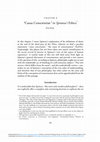Books by Lia Levy

A Companion to Spinoza, 2021
This chapter argues that the Ethics includes versions of the views about sensation and its role i... more This chapter argues that the Ethics includes versions of the views about sensation and its role in the production of knowledge that are present in the TIE and the KV. ‘Idea of an affection’ replaces the earlier terms for sensation. A sensation is a modification of the mind closely associated with a modification of body and explained in terms of the mind-body relation. In the KV, Spinoza continues to treat sensation as the immediate perception of corporeal modification and continues to take the inference from sensation to the union of mind and body as a valid one. The KV is the earliest source of Spinoza's view that the idea-object model accounts for the mind-body relation. The only occurrence of sensatio in the CM might seem to tell against an account of sensation as something different from imagination. Accounts of reason and imagination in the Ethics considerably advance Spinoza's theory of knowledge.
Collection of Essays (organization/edition) by Lia Levy
O presente livro reúne artigos escritos por diversos filósofos brasileiros e estrangeiros acerca ... more O presente livro reúne artigos escritos por diversos filósofos brasileiros e estrangeiros acerca de diferentes questões e temas filosóficos. O que dá unidade a este volume é o fato de seus autores ofertarem seus textos à celebração da vida e da trajetória acadêmica de Raul Landim Ferreira Filho e Guido Antônio de Almeida, por ocasião de seus aniversários de 80 anos. Este livro é aos dois dedicado em agradecimento por tudo que aprendemos com os mestres e pela valiosa convivência ao longo dessas décadas.
Livro em homenagem ao filósofo brasileiro Luiz Henrique Lopes. Nesta obra alguns nomes da filosof... more Livro em homenagem ao filósofo brasileiro Luiz Henrique Lopes. Nesta obra alguns nomes da filosofia brasileira discorrem sobre a filosofia analítica e vários assuntos da filosofia do início do século XXI.
Esta coletânea comemora os 60 anos de Guido Antônio de Almeida e Raul Ferreira Landim Filho , Pro... more Esta coletânea comemora os 60 anos de Guido Antônio de Almeida e Raul Ferreira Landim Filho , Professores Titulares do Departamento de Filosofia da Universidade Federal do Rio de Janeiro. Conhecido internacionalmente sob o nome de Festschrift , este tipo de publicação é bastante comum na comunidade acadêmica internacional, bem como a homenagem que ele veicula. Trata-se de expressar publicamente o reconhecimento da importância do trabalho daqueles que tenham contribuído para o avanço no estudo e na pesquisa em uma determinada área de conhecimento. De uma forma geral, são chamados a contribuir tanto pesquisadores que tenham sido diretamente formados pelos homenageados quanto colegas com os quais tenham dialogado no transcorrer da vida acadêmica.
Chapters by Lia Levy

La Générosité à l’œuvre. Hommage à Jean-Marie Beyssade, 2019
Je propose d’examiner un problème soulevé par la démonstration de la proposition 3 de la cinqu... more Je propose d’examiner un problème soulevé par la démonstration de la proposition 3 de la cinquième partie de l'Éthique, qui établit la possibilité d’annuler le caractère passif d’un affect par sa connaissance claire et distincte. La démonstration suppose que cette connaissance ne peut réaliser la tâche que Spinoza lui confère que parce qu’elle est la même que l’idée qui constitue la passion, c’est-à-dire qu’elle ne se distingue de la passion que par une distinction de raison. Or, comment Spinoza peut-il justifier cette thèse? Je soutiens, avec J.-M. Beyssade, que le philosophe peut parfaitement justifier cette thèse et, ce faisant, il arrive à dépasser la dualité de notre affectivité. Par ailleurs, j’espère pouvoir établir, de façon préliminaire, la plausibilité d’une hypothèse plus générale, qui reconnaît aux rapports entre les concepts d’affectio et d’affectus un rôle central pour l’unité architectonique de l’Éthique, dans le sens où ils peuvent expliquer comment ses cinq parties, avec leurs thèmes propres, tiennent ensemble pour constituer une éthique.
Référence complète:
Levy, Lia. 2019. “Affectio et Affectus : Commentaires Sur l’unité Architectonique de l’Éthique.” In: La Générosité À l’œuvre. Hommage À Jean-Marie Beyssade, edited by Chantal Jaquet, 101–22. Paris: Classiques Garnier.

Spinoza's ‘Ethics' A Critical Guide, 2017
n this chapter, I assess Spinoza’s explanation of his definition of desire at the end of the thir... more n this chapter, I assess Spinoza’s explanation of his definition of desire at the end of the third part of the Ethics, wherein we find a peculiar expression: “causa conscientiae,”“the cause of consciousness” (E3DA1). Surprisingly, this phrase has not been taken into much consideration in the recent revival of interest in Spinoza’s view of this aspect of human experience. A careful study of this text will shed some fresh light on Spinoza’s general discussion of consciousness and provide a new answer to the question of why, according to Spinoza, philosophy ought not to start with the indubitable act of thinking of a self-conscious subject. This new answer, which differs from the usual – and also undoubtedly correct – one, makes no use of Spinoza’s conception of the true order of understanding, and therefore that of true philosophy, but relies rather on the sense and limits ofthe conception ofconsciousness that can be apprehended from the analysis of this passage.
Metafísica, Lógica e outras coisas mais., 2012
Ética, política e esclarecimento público: ensaios em homenagem a Nelson Boeira, 2012
Estudos de Filosofia Moderna, 2011
O conceito cartesiano de atributo principal 1
Lições de história da filosofia, 2009
La theorie spinoziste des rapports corps/esprit et ses usages actuels, 2009
L'article essaye d'avancer l'hypothèse selon laquelle la distinction entre les conceptions cartes... more L'article essaye d'avancer l'hypothèse selon laquelle la distinction entre les conceptions cartesienne et spinoziste des rapports esprit/corps se situe dans le niveau plus profond des différents diagnostiques que ces doctrines supposent concernant les conditions d'emergence du probleme éthique por l'être humain.
Meu objetivo neste texto é simplesmente analisar o quarto parágrafo da Segunda Meditação (AT VII,... more Meu objetivo neste texto é simplesmente analisar o quarto parágrafo da Segunda Meditação (AT VII, 24-25; IX-1,19), no qual ele supostamente apresenta este mesmo argumento sem empregar a famosa expressão. Das muitas, diversas e relevantes questões filosóficas que este argumento suscita, gostaria de me concentrar em investigar se ele pode ser reconstruído sem que seja necessário introduzir – como uma premissa não justificada – a concepção do pensamento como sendo essencialmente consciência de si e, portanto, como envolvendo - por definição, a auto-referência imediata e incorrigível do sujeito a si mesmo. Gostaria de poder mostrar que o argumento não apenas independe dessa concepção como, além disso, conduz a essa concepção; todavia, somente o primeiro passo em direção a esta interpretação será dado neste artigo.
Freud e seus Filósofos, 2004
Obs: Há um erro na grafia do meu sobrenome. / My surname is misspelled.
Papers by Lia Levy

Spinoza's ‘Ethics'
n this chapter, I assess Spinoza’s explanation of his definition of desire at the end of the thir... more n this chapter, I assess Spinoza’s explanation of his definition of desire at the end of the third part of the Ethics, wherein we find a peculiar expression: “causa conscientiae,”“the cause of consciousness” (E3DA1). Surprisingly, this phrase has not been taken into much consideration in the recent revival of interest in Spinoza’s view of this aspect of human experience. A careful study of this text will shed some fresh light on Spinoza’s general discussion of consciousness and provide a new answer to the question of why, according to Spinoza, philosophy ought not to start with the indubitable act of thinking of a self-conscious subject. This new answer, which differs from the usual – and also undoubtedly correct – one, makes no use of Spinoza’s conception of the true order of understanding, and therefore that of true philosophy, but relies rather on the sense and limits ofthe conception ofconsciousness that can be apprehended from the analysis of this passage.
Analytica. Revista de Filosofia, 2013
Hic sine dubio lectores haerebunt multaque comminiscentur quae moram injiciant et hac de causa ip... more Hic sine dubio lectores haerebunt multaque comminiscentur quae moram injiciant et hac de causa ipsos rogo ut lento gradu mecum pergant nec de his judicium ferant donec omnia perlegerint. (Ética 2, prop. 11, escólio) 1 * Pesquisa realizada com o apoio do PRONEX/FAPERJ/CNPq-Predicação e Existência (E-26/110.565/2010).

Giornale critico di storia delle idee, Jun 1, 2018
In 1995 the publication of Marleen Rozemond's paper Descartes's Case for Dualism ... more In 1995 the publication of Marleen Rozemond's paper Descartes's Case for Dualism has triggered the revival of the discussion on his argument in favor of the real distinction between body and soul among the Anglo-Saxon scholars. In particular the discussion then resumed was on the necessity of introducing a hidden premise (the so called the attribute premise) in order to regain its probatory character. This debate has reflected on the Cartesian studies in Brazil and my objective in this text is to bring to the debate two texts still unexplored related to this interpretative problem. My hypothesis is that the attempts to justify the thesis that the substance has exactly one principal attribute have not yet better succeeded because they underestimated the contribution brought about by the transformation of the notion of nature entailed by the introduction of the concept of principal attribute. Understanding the Cartesian proof of substantial dualism, and more particularly the “attribute premise”, would involve, I suggest, the thesis according to which the concept of principal attribute, insofar as it expresses the essence of the substance, is not – and cannot be – according to Descartes, an abstract universal, but rather a particular nature.











Uploads
Books by Lia Levy
Collection of Essays (organization/edition) by Lia Levy
Chapters by Lia Levy
Référence complète:
Levy, Lia. 2019. “Affectio et Affectus : Commentaires Sur l’unité Architectonique de l’Éthique.” In: La Générosité À l’œuvre. Hommage À Jean-Marie Beyssade, edited by Chantal Jaquet, 101–22. Paris: Classiques Garnier.
Papers by Lia Levy
Référence complète:
Levy, Lia. 2019. “Affectio et Affectus : Commentaires Sur l’unité Architectonique de l’Éthique.” In: La Générosité À l’œuvre. Hommage À Jean-Marie Beyssade, edited by Chantal Jaquet, 101–22. Paris: Classiques Garnier.